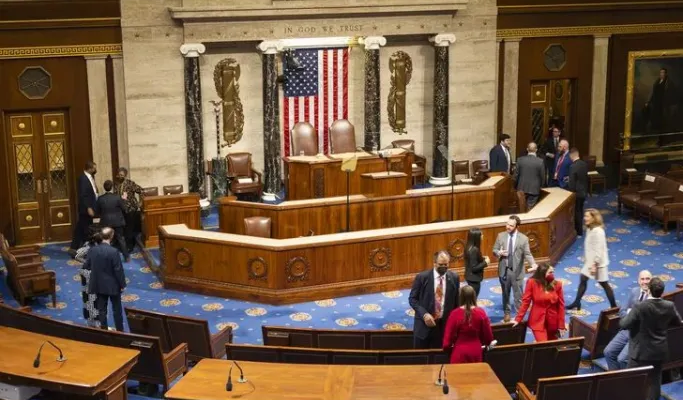an overwhelming 85-14 vote, clearing the way for President Biden to sign it into law. While the bill, which supports critical military programs and operations, garnered strong bipartisan backing, a controversial provision on transgender treatment sparked significant opposition from some Democrats.

The proposal has faced strong criticism from civil rights organizations, progressive lawmakers, and LGBTQ+ advocacy groups. They have condemned it for restricting certain types of gender-affirming care for transgender children of service members.
Opponents of the provision argue that it is inappropriate to include such a measure in a defense bill, accusing supporters of politicizing military policy by targeting an already vulnerable group. In response to the transgender care restriction, several Democratic members broke ranks with the majority and voted against the package. Senators Elizabeth Warren (D-MA) and Bernie Sanders (I-VT) were among those who opposed it, calling the clause unnecessary and discriminatory.
“Transgender children and their families, who already face significant challenges, are being attacked by this measure,” said Senator Warren. “It is wrong to promote such harmful practices through a defense law.”

The Democrats who opposed the provision faced a difficult choice: support a defense bill crucial for funding the country’s security or vote against it to protest the contentious clause. Senator Bernie Sanders (I-VT), while acknowledging the NDAA’s significance, stated, “I cannot in good conscience support a bill that includes provisions aimed at denying essential care to a marginalized group.”
Despite their concerns, some Democrats chose to support the bill. Senate Majority Leader Chuck Schumer (D-NY) called the NDAA “imperfect” but emphasized its vital role in military support. “Even though I strongly disagree with the inclusion of this provision, dismissing the entire bill would jeopardize critical weapons programs, troop pay raises, and our ability to counter growing threats worldwide,” Schumer explained.
Supporters of the transgender care restriction, mostly Republicans, defended it as a preventive measure to stop what they view as inappropriate medical treatments for children. Senator Josh Hawley (R-MO), a staunch advocate of the provision, stated, “This is about protecting children and ensuring that taxpayer dollars are not used for experimental medical procedures.”
While critics contest this viewpoint, conservatives argue the issue centers around parental rights and fiscal responsibility. LGBTQ+ organizations and progressive lawmakers contend that the bill is part of a broader push to marginalize transgender people, particularly in areas where such laws are gaining traction.
The NDAA also includes several key military funding and policy provisions for fiscal year 2025, such as a 5.2% pay raise for troops, investments in advanced weaponry, and measures to strengthen cyber defenses against threats from nations like China and Russia. However, the inclusion of the transgender care restriction has complicated what should have been a straightforward legislative process. Critics warn that tying national defense funding to social policy could set a dangerous precedent and further polarize Congress.
LGBTQ+ advocacy groups are vowing to challenge the provision both in court and through future legislation. Sarah Warbelow, legal director of the Human Rights Campaign, called the clause “an unconscionable attack on transgender children and their families.” She added, “These families deserve the same respect and access to care as everyone else because they sacrifice so much for our nation. In addition to violating their rights, this clause sends a negative message to all transgender people who are in or associated with the military.”
Given the NDAA’s importance for military operations, it is expected that President Biden will sign it into law. However, White House representatives have made it clear that the administration opposes the transgender care ban and will seek ways to address it after the bill is enacted.
Advocacy groups and Democratic officials are committed to continuing the fight. House Minority Leader Hakeem Jeffries (D-NY) described the provision as “deeply troubling” and hinted that Democrats will push to have it removed in future legislation.
This situation underscores the deep divisions within Congress over LGBTQ+ rights and highlights the ongoing tension between social issues and military strategy. The debate over transgender care is far from over, but for now, the NDAA moves forward with its crucial funding provisions intact.

The passage of the NDAA underscores the delicate balance legislators must maintain between addressing national security needs and navigating contentious social issues. The inclusion of the transgender care restriction has highlighted divisions within both parties, even though the law itself represents a critical investment in the military. This ongoing debate reflects the complex intersection of defense priorities and social policies, with significant implications for both military strategy and civil rights.
For many lawmakers, the vote was a tough compromise. Senator Tammy Baldwin (D-WI), the first openly LGBTQ+ senator, shared, “This was not an easy decision. I will continue to fight to ensure that this discriminatory provision is repealed, but in the end, I supported the NDAA because our troops deserve the resources they need.”
The broader implications of tying social policy to defense spending are likely to shape future congressional debates once the NDAA is signed into law. While the bill is advancing, the battle over its controversial provisions is far from over.



